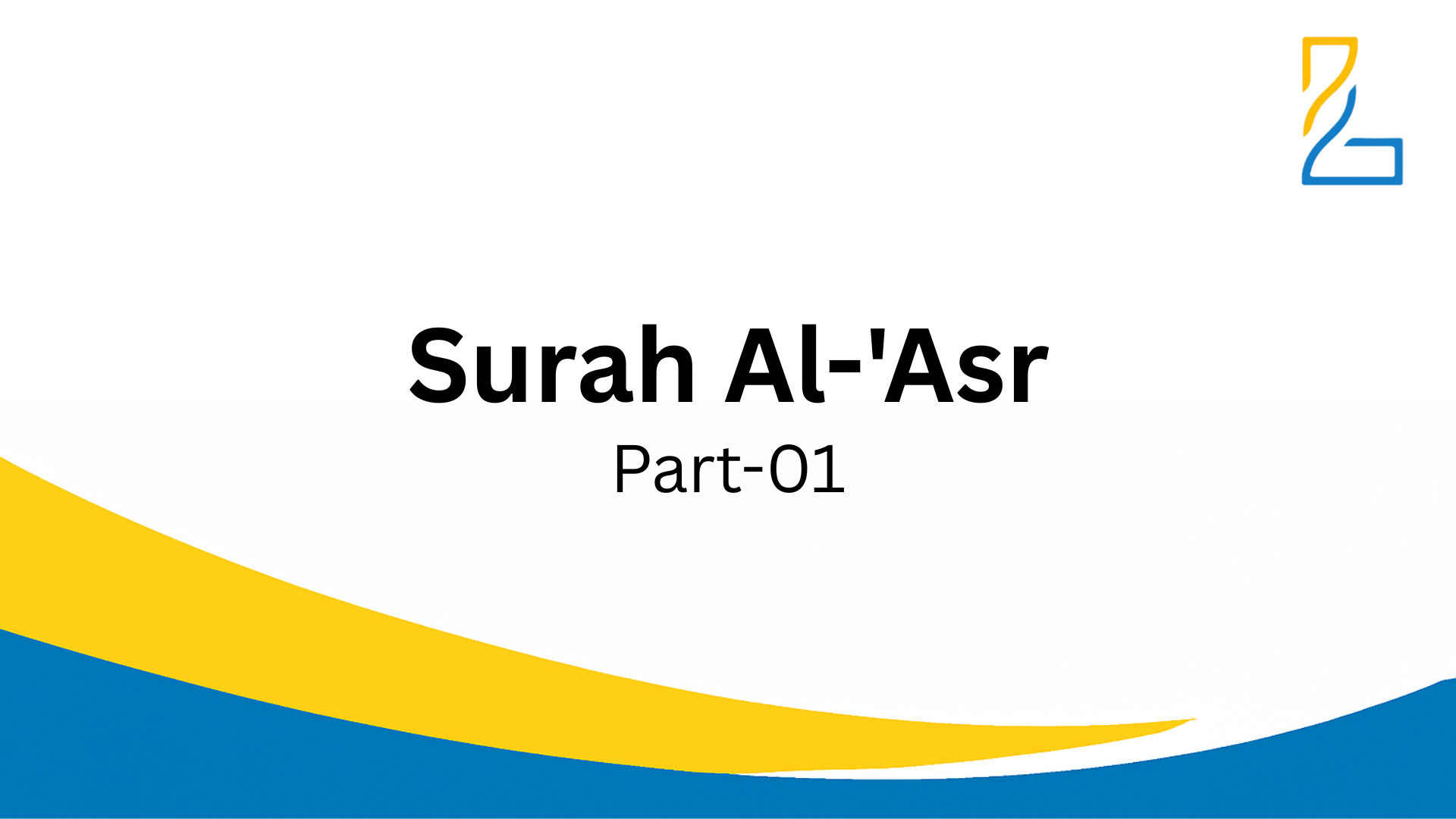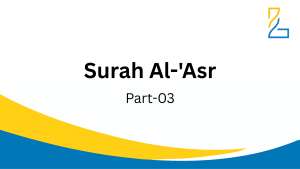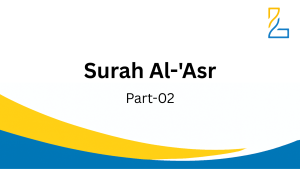Understanding Surah Al-‘Asr: A Warning About Time and Loss
Simple Translation of Surah Al-‘Asr:
“By time,
Indeed, mankind is in loss,
Except for those who have believed and done righteous deeds and advised each other to truth and advised each other to patience.”
(Surah Al-‘Asr 103:1-3)
A Deep Look into Surah Al-‘Asr
Surah Al-‘Asr is a short but powerful chapter centered on the theme of loss (khusr). It is positioned between Surah At-Takathur (102) and Surah Al-Humazah (104) in the Qur’an. The last verse of Surah At-Takathur says:
“Then you will surely be asked that Day about pleasure.”
(Surah At-Takathur 102:8)
Here, Allah tells us that we will be questioned about all the niyamah (blessings) we received in this life. What is the greatest blessing of all? It is Time. Time is the greatest niyamah, and Surah Al-‘Asr is about just that — Time.
Surah Al-Adiyat warns us about our heedlessness and worldly distractions:
“Indeed, mankind is, to his Lord, ungrateful,
And indeed, he is to that a witness.
And indeed he is, in love of wealth, intense.”
(Al-Adiyat 100:6-8)
But in these Surahs, Allah does not explicitly tell us what we are distracted from. Surah Al-‘Asr confronts us directly with the question: What are we heedless of? What distracts us the most? The answer is clear — Time. Time is the one thing we carelessly waste the most.
Surah At-Tin and Surah Al-‘Asr
In Surah At-Tin, Allah honors humanity by declaring:
“We have certainly created man in the best of stature;”
(Surah At-Tin 95:4)
This verse beautifully affirms the dignity and perfection with which we were created — in the finest form and with the highest potential. Yet, just a few chapters later, Surah Al-‘Asr delivers a sobering reality:
“Indeed, mankind is in loss,”
(Surah Al-‘Asr 103:2)
The word used here for loss is “Khusran” (خُسْرٍ), a powerful term that signifies an absolute, devastating loss. To understand this better, consider the word “Luksan” (لُكْسَان), which is a more general term for loss.
Imagine you invest $1000 in an egg-selling business but end up selling the eggs for only $700. That’s a typical financial loss — a Luksan. But now picture this: you’ve invested everything you have, the entire $1000. On your way to sell the eggs, you accidentally trip over a shirt vendor’s stall, breaking all your eggs and ruining his merchandise. You lose all your money, and now you owe compensation for the vendor’s loss as well. This is no ordinary loss; this is an absolute ruin — a true Khusran. This heavy word is the one used for loss in this Surah!
Surah Al-‘Asr tells us that most people are in this kind of big loss. Even though Allah created us in the best form, why are we in this situation? The answer lies in our own choices. Allah has given us free will and the most valuable gift — Time. Everyone has this gift, whether a child, a poor person, or someone who is sick. Allah gives time to everyone. But sadly, we often waste this precious time on things that don’t matter. Even though we are made in the best way, instead of using these blessings well, we run after short-term, worldly things. Like Surah Takathur says, many of us get stuck in the rat race for more and more material things, forgetting the real reason why we are here.
This is why we suffer this unimaginable loss — the kind of ruin that goes far beyond mere financial setbacks. It is a spiritual collapse, a failure to fulfill the potential with which we were created. Surah At-Tin talks about our noble origin, while Surah Al-‘Asr delivers the grave warning: we risk losing everything if we neglect the path of faith, good deeds, and patience.
May this truth awaken us to the urgency of valuing our time and purpose, so that we do not become among those who suffer Khusran — the absolute loss, which ultimately means the torment of Jahannam. This is the true ruin we must avoid. May Allah protect and guide us all on the straight path, Ameen.
Four Conditions to Escape Loss
In the second verse of Surah Al-‘Asr, Allah makes a powerful statement: everyone is in great loss. This means that the majority of people are at risk of losing out — both in this life and the Hereafter. But then, in the very next verse, Allah introduces the word “illa” (إِلَّا), which means “except.”
This word is a turning point. It tells us that not everyone is doomed to loss. There is a special group of people who are exempted from this loss — but who are they? Allah makes it clear: only those who fulfill four important conditions can escape this loss.
These four conditions are:
- Having ‘imaan (faith)
- Doing ‘amal-us saliha (righteous deeds)
- Advising each other to truth
- Advising each other to patience
Notice something very important — these four are connected by the Arabic word “wa” (و), meaning “and,” not “or” (“aw” أو). This means we must do all four, not just some of them. To avoid loss — which ultimately means being saved from Jahannam — all these conditions must be met together.
While many Surahs mention just two key conditions — faith and good deeds — Surah Al-‘Asr goes further. It adds the vital roles of encouraging truth and patience in others. This shows us that our responsibility is not just personal; it also includes helping and supporting others on the right path.
To better understand the power of the word “illa” (except), imagine this: Mr. Rahim holds a large walima for his son. Almost everyone from his relatives attends. At the end, Mr. Rahim checks the guests and sees that everyone came, except Khalid and Walid. Here, those who didn’t come — Khalid and Walid — are the exception, and they are very few compared to the majority, who came.
In the same way, Allah first declares that the majority of people are in loss — meaning they will face Jahannam — but then filters out the small minority who will be saved, using the word “illa.” This shows how precious and rare those who escape loss truly are. May Allah protect us and keep us among those few who are saved from the fire of Jahannam, Ameen.
Allah also generously teaches us exactly how to be among those saved: by fulfilling these four conditions — faith, righteous deeds, advising truth, and encouraging patience. These four principles hold the entire purpose and philosophy of life.
When we see someone with a halal income, praying five times a day, and giving Zakat, we often think, “This person is a good Muslim.” However, according to Surah Al-‘Asr, even such a person may still be in Khusran — the absolute loss. Why? Because, while they are fulfilling the first two conditions — faith (‘imaan) and righteous deeds (‘amal-us saliha) — they are missing the other two essential conditions: advising others to truth and encouraging patience.
A person may be focused on their own personal worship, like maintaining halal income, praying, and giving Zakat — but if they are not actively or passively preaching to others, they are simply “oiling their own machine.” This is not enough. We are called to do more — to share the guidance of Islam with our friends and family. It’s not just for their benefit; it’s for our own good too, because we cannot avoid Jahannam without fulfilling these duties.
Now, consider this: if we do not engage in preaching and advising others, we are not fully practicing ‘amal-us salihat (righteous deeds). Advising others to do good is an essential part of righteous deeds, and it requires patience. Sometimes, we may need to advise someone who is struggling and feeling down, reminding them to have patience. And at times, others will need to advise us.
Here’s where the interconnection among these four things becomes clear: Without patience, we cannot advise others. Because if we lack patience, we won’t have the strength or compassion to guide those in need. And if we don’t advise others, we are not fully engaging in ‘amal-us salihat because true righteousness involves helping and guiding others. And if we are not practicing ‘amal-us salihat, it means we don’t have strong ‘imaan.
Ultimately, if we are not practicing these four essential actions — faith, righteous deeds, advising truth, and patience — it points to one core issue: weak ‘imaan (faith). If our faith is strong, the patience, guidance, and righteous deeds will flow naturally from us. If our faith is weak, we struggle to meet these conditions fully.
Therefore, it all comes down to strengthening our ‘imaan. When our faith is strong, we will be able to fulfill all four conditions effortlessly. But if our ‘imaan is weak, we may find ourselves lacking in one or more of these key areas, leading to the loss Allah warns us about in Surah Al-‘Asr.
May Allah strengthen our faith and guide us to fulfill all four conditions to avoid Khusran and secure our place in His mercy. Ameen.
Despite its short length, Surah Al-‘Asr carries a deep and powerful message that can transform our outlook completely. If we sincerely read, understand, and practice this Surah, our mindset and hearts will change. We will begin to see life in a whole new light and discover its true meaning and purpose.
Imam Shafi’ (RA) beautifully said,
“Whoever reflects deeply on this Surah, it is enough for his guidance.”
(Ibnul Qayyim, Miftah Daris Sa’adah, 1/152)
There is also a beautiful narration from Abdullah ibn Hisn (RA):
“Whenever two companions of the Prophet ﷺ met, they would not part until they recited Surah Al-‘Asr to each other, greeted with salaam, and then left.”
(Tabarani, Al-Mu’jam Al-Awsat, 5124)
This shows the special place this Surah held in the hearts of the Sahabah — a small chapter carrying a big message, powerful enough to remind, unite, and guide. It serves as a summary of the Qur’an, Islam, and the Sunnah of Prophet Muhammad ﷺ. The Sahabah used to remind each other about the Qur’an, deen, and also the dunya — with this simple, short Surah. Look at us! What do we do? Friends gather to gossip about who earns more, whose life is more sorted, who won the UCL this year! We talk about sports, movies, and waste hours watching TV series and anime, often talking about them endlessly. If we are not in Khusran, then who is?
We are worried that our team might lose today’s game, while the Sahabah were so deeply concerned about their akhirah (afterlife) that we cannot even imagine. Not only were they worried about their own selves, but they used to remind others by reciting this Surah! SubhanAllah!
May Allah give us the strength and faith to at least try to be like them.
We can see the perfect reflection of Surah Al-‘Asr in the Seerah of the Prophet ﷺ. We should study the Seerah to understand the Prophet ﷺ better. It will make us love him ﷺ more, love Islam more, and become humble. May Allah guide us all on the right path and grant us deeper understanding.



